Becoming aware of our differences
When Sam and I first started dating, neither of us really gave our cultural background much thought.
We were simply two people attracted to one another, and our main concern at the time was the distance that separated us. I still remember walking on a snowy path near my home in Canada, daydreaming about the day I would fly back to Tanzania, where my view would not be rows of homes with snow-laden roofs, but instead, rows of banana, mango and avocado trees. And I would be promenading next to Sam. I was able to romanticize just everything back then, and I was pretty confident that life was about to take a more exciting turn.
And while I was right about the exciting part, I didn’t stop and consider just how “challenging” these exciting changes would be as I settled down in Tanzania.
One of the incidents that was one of my “A-ha” moments was when Sam and I got into our very first fight as a couple. I can’t recall the exact details of it, but I do remember storming off from where we stood – in the middle of the marketplace in the bustling city centre in Arusha – leaving a very perplexed Sam behind. The argument may or may not have been the fact that he prioritized the upcoming football match over our date.
But back to the incident. I distanced myself from him, struggling to pull my purse over my shoulder since I had just purchased some handcrafted, wooden souvenir from the local curio shop. Ever so considerate, Sam approached me from behind and attempted to help me with my purse, but instead, I pulled away from him abruptly and asserted that I didn’t need any help from him with a furious glance.
From that moment on, he kept a polite distance from me, and walked on quietly until we got to the car. It didn’t occur to me until we got inside of the vehicle that he was visibly upset. If you’ve met Sam, you’d know that he has such an easygoing personality, and he is not easily flustered. And this side of Sam was also new to me. Our relationship, at the time, was mostly based on phone calls, texts, and e-mails, and this was the first time for me to witness him in an unhappy state.
“What? Are you upset?” I wasn’t feeling so cheery myself, but I thought I’d make the first step and clear the air.
We were both sitting inside the car now, and I saw his hands clutching unto the steering wheel.
“It’s just—you can’t do that here,” he said.
Confused, I asked him to clarify. Do what? What exactly did I do wrong, except refusing to talk to him in public because I was upset at him?
“When I tried to help you with your purse, you pulled away from me,” he said.
“Yeah, I could carry my own things. What’s wrong with that?” I said, still not grasping whatever he was trying to tell me.
“Well, it can be dangerous.”
His eyes were serious but earnest. I waited for him to continue, while he waited for me to clue in.
“Why would that be dangerous?” I asked.
“Do you know about mob justice?”
I stared at him incredulously. Mob justice? Did I just inadvertently put his life in danger by simply acting out? Seeing my face change, Sam realized that this was an unfamiliar notion to me. We were, after all, still getting to know each other—not to mention the very different cultural background to take into account. Sam took a deep breath, looked me dead in the eye and as he proceeded to explain how delicate our situation was.
“When they see me, a local Tanzanian, interacting with you, a tourist, and you acting like you didn’t know me, and pulling your purse away—they will think ‘thief’. And here, when a crowd decide to teach a thief a lesson, sometimes it doesn’t end well.”
“End well?” I began to weave a picture of the situation in my head, but still, I wanted him to clarify it for me. I didn’t want to keep making assumptions, especially if it meant that harm could come to him because of my ignorance.
“Well, people get stoned to death,” Sam started. He saw the horror rise in my eyes, and he gave me a quick, reassuring smile. “I mean, it doesn’t happen often. But someone could definitely get hurt.”
“I’m sorry, I had no idea.” I found the whole situation very difficult to swallow. But it was and still is a reality in Tanzania, and though I have yet to be a witness of such a thing, I’ve heard of some friends and acquaintances who have been caught in the middle of a ‘mob justice’ situation.

As we made our way back home, I passed by the crowded streets of this city I was only beginning to know, it dawned on me that there were going to be many more hurdles we’d have to overcome. These small incidents were just lightning bolts in the sky, announcing the tumultuous storm that was on the horizon. This relationship was more than just the feelings we had for each other. It irked me to admit that my mother was right after all. Our journey wasn’t going to be as simple as I thought. I had entered in this culture ill-equipped in all ways possible. I didn’t speak much Swahili, I didn’t have any friends in this town, and I had no prior understanding of the complex dynamics of a cross-cultural relationship. Were we prepared for the thunderstorm?
Soon, Sam and I found ourselves in one of the busiest streets in Arusha. Curious glances were cast our way, and it was obvious that Sam and I stood out in the middle of the crowd. But the attention didn’t bother me, at least not back then, anyway, and we strolled lazily past the shops, our hands barely touching since Tanzania was still somewhat conservative back then, but there was no doubt that we were now being seen as—and were, in every way, a couple. And we were in this together now, come what may.
-short excerpt from my upcoming memoir “The Last Seat on Safari”





One Comment
Dianne Seffens
Well done I will need to read more of this.